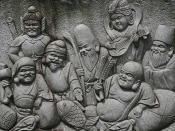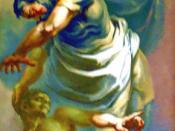Although dismissed by many philosophers as nonsensical and irrelevant, religious beliefs are still held by over half of the world's population and therefore the subject must be valid as an area of intellectual discussion. This particular area of thought gives rise to much skeptical debate as the logical fallacies offered by believers seem flawed when held to close scrutiny. It is particularly interesting in that the skeptical problems also go further than merely questioning the validity of the proofs but in fact can be taken so far as to actually question the validity of the original presupposition; that is, that we can even sensibly ask the question, "Does God exist," in the first place.
There are three primary logical fallacies that have been offered by apologists wishing to defend their religious belief. The first of these is a metaphysical proof originally invented by St. Anslem and was formally envisaged by Descartes in his fifth mediation (Van Inwagen, 102).
It is known as the ontological argument. The foundations of this argument lay in the supposition that anyone attempting to deny the existence of God would be contradicting themselves in the act of merely conceptualizing the thought. (Southern, 259). To begin this argument it must first be determined that the idea of God is that of a supreme being whom is a sum of all possible perfections. Then, the argument continues by claiming that for a skeptic to suggest that there is no God a person would need to envisage within their mind a God who lacks one vital perfection: existence. This is a contradiction because if God is being envisioned, another greater being who contains all those perfections while also containing the perfection of existence must also be envisioned. Therefore the God that is claimed does not exist can be superseded...


